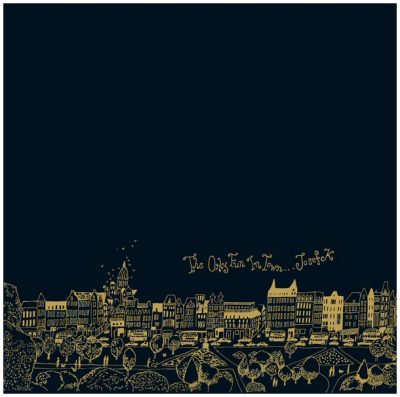Alistair Braidwood is charmed by the story of Scotland’s innovative post punk outsiders
Support independent, non-corporate media.
Donate here!

Taken from a lyric from their song ‘It’s Kinda Funny’, Through The Crack In The Wall is an apposite title for Johnnie Johnstone’s biography of Scottish post-punk pioneers Josef K who, almost from from the beginning, appeared to be a band who never quite belonged – the outsiders’ outsiders. As a result they would find a deeply committed fanbase, but not necessarily the wider fame and acclaim they deserved. It’s appropriate that the foreword to the book is by Stewart Lee, a comedian who refuses to fit in – who, in fact, actively pushes against such an idea. In his idiosyncratic intro Lee confirms the band’s reputation and why that appealed to him. It’s clear his admiration is heartfelt. With Josef K, the question remains, “was cult status gained by accident or design?”. Through The Crack In The Wall examines that central question, and others which result from it. This was a band defined as much by what they weren’t as what they were.
There were always more questions than answers. Why did the band from Edinburgh’s suburbs get signed to Glasgow’s legendary Postcard Records, making them appear (not only to music lovers, but to themselves) a band apart? While their labelmates embraced the stylings of mid-America (fringe jackets, plaid shirts, and 12-string guitars) they were influenced by a more European aesthetic, starting with their Franz Kafka inspired name but also the sharp haircuts, roll-neck jumpers, and the existential musings of their lyrics. Typical of the band, it wasn’t that straightforward. Musical influences included Talking Heads and Television (particularly on guitarist Malcolm Ross) but also disco legends Chic. Such unexpected details are where this biography excels, looking beyond the accepted wisdom to fill in the gaps, and bring the hidden depths to the fore.
It can be argued that Josef K were closer in style and content, if not sound, to the emerging Simple Minds rather than any of their Postcard peers (and it’s interesting to note that Simple Minds’ alumni Derek Forbes, and later Brian McGee, would go on to play with Propaganda who would cover Josef K’s ‘Sorry For Laughing’). However, Johnnie Johnstone clarifies why Josef K were attractive to Alan Horne and his emerging indie label – they shared an innate pop sensibility with the likes of Orange Juice, Aztec Camera, and The Go-Betweens, both in their hearts and in their songs. Also, at this time ideas and ideals were arguably as important as the music itself. Post punk was where the DIY rhetoric of punk often met the theories of Situationism, as exemplified by bands such as Gang of Four, The Pop Group, as well as Josef K.

Through The Crack In The Wall is the first ever biography of the band, which is extraordinary when you consider they are arguably the most influential of those who came to be known as ‘The Sound of Young Scotland’. It’s difficult to imagine The Wedding Present, The June Brides, and even The Smiths, without the sound and stylings of Josef K. Later, Franz Ferdinand in particular would wear those influences with pride. That style can be seen in the, mainly black and white/sepia, images of the band in the book, which capture an aesthetic which was cool, clean, and seemingly calculated.
Success in anything involves timing, and that’s certainly the case with bands. An example I always cite is how One Dove’s brilliant album Morning Dove White release was delayed, and by the time it came out the club/rock crossover that exploded post-Screamadelica had passed, and grunge and the early stirrings of Britpop were happening, otherwise, I believe, it and they would have been huge. Johnnie Johnstone rightly makes big play on the fact Josef K’s ‘debut’ release was complicated to say the least (too complicated to go into details here) and as a result the critical momentum which was behind the band was slowed, if not lost altogether. There remained champions, such as well-respected journalists Paul Morley and Simon Reynolds, and the fanatical fan base, but musical tastes and times move on quickly, and it appeared Josef K’s had passed.

Perhaps naturally, increasingly focus fell on lead singer and main songwriter Paul Haig, who would embark on an underrated solo career, releasing albums such as Rhythm of Life, Cinematique Vols 1, 2 and 3, and my personal favourite Chain. Although he retained a presence in the music, and style, magazines throughout the ‘80s, and fellow members would go on to collaborate and play with other bands, they would never be as powerful as they were together. To this day their music continues to be discovered by new generations, perhaps second or third-hand through others they also influenced, but when you hear it, you know.
At the heart of Johnnie Johnstone’s biography is exhaustive research, including interviews with, and direct quotes from, those who were there or thereabouts. Such was the bands’ mythical status (which only grew once they had split) that many have claimed to “be there” at Josef K gigs when the numbers just don’t add up. But when those featured include Douglas MacIntyre (whose own book Hungry Beat – written with Grant McPhee & Neil Cooper – features Josef K on the paperback cover), The Associates’ Alan Rankine, Nick Currie (aka Momus), Edwyn Collins, Steven Daly, the aforementioned Alan Horne, and many more, as well as the band members themselves, what is clear is that this is a story thoroughly examined, and both impeccably sourced and told.
Through The Crack In The Wall is much more than an introduction to Josef K. It is a must read for fans, but also for anyone wanting to learn more about what was a pivotal time in Scottish music and culture, and in doing so you just might discover your new favourite band. As with the best band biographies it will send you straight to the music, which is where the rest, and the best, of the narrative is to be found. You may know the name, but you won’t know the story. And if you think you know the story, think again.
Through The Crack In The Wall: The Secret History of Josef K is published by Jawbone Press.










